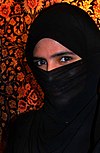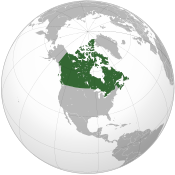Elections Canada stands by decision, Muslims not required to remove veils at polls
Monday, September 10, 2007

The Canadian government is in heated debate regarding a law which allows Muslims to wear veils at the polls. It has been decided, amid concerns from Prime Minister Stephen Harper, that the law will not change, and women are still allowed to wear veils when appearing to cast votes at the ballot box.
PM Harper says a ruling which Elections Canada made in July to allow veils was wrong. Over the past week politicians from all three major federal parties are agreeing with Harper's stance on the issue.
"I have to say that it concerns me greatly, because the role of Elections Canada is not to make its own laws. It's to put into place the laws that Parliament has passed, so I hope they will reconsider this decision," Harper said in Australia after the APEC summit officially ended. "But in the meantime, if that doesn't happen, Parliament will have to consider what actions it's going to take to make sure its intentions are put into place...We just adopted this past sitting in the spring, Bill C-31, a law designed to have the visual identification of voters. It's the purpose of the law … and I think this decision goes in an entirely different direction."
By disallowing the wearing of veils Elections Canada can determine if a voter is voting twice on the same day. But about eighty-thousand Canadians voted by mail during the 2006 general election, which makes the problem seem even more complex.
"It's primarily because no (Muslim) groups came forward requesting special treatment," said NDP leader Jack Layton.
"We would ask Elections Canada to reconsider its decision, and to require veiled women to unveil their faces to confirm their identities," Liberal leader Stephane Dion said in a statement on September 7.
The Bloc Québécois proposed a bill asking people with veils to take them off on when they vote in federal elections, as well as Quebec premier Jean Charest, who made his complaints public on September 7 [1]. They wrote a letter to Elections Quebec asking that Muslim voters be required to unveil in three upcoming by-elections next Monday. The decision ended allowing Muslims to wear their veils. "In the case of a niqab or burka during the federal byelection that'll take place Sept. 17, the [chief electoral officer] has made the identification of electors impossible," said lawmaker Michel Guimond.
"We designed the bill to improve the possibility of identification of the voters...It's not a question of numbers. When you go to a polling station, you must show your face," Guimond said at a press conference in Ottawa earlier on Monday, before the final decision was made.
If Muslims don't want to unveil and if they don't have ID with them they can just make an oath verifying their identity and provide an address before voting, says Marc Mayrand, Chief Electoral Officer with Elections Canada. Elections Canada volunteers at the voting stations can also ask for the unveiling of a voter. Or another person, who lives in the same riding, can verify their identity. If the voter only brings one piece of information then they may be asked to unveil (but are not required), although a picture (or unveiling) is not required if two ID's are presented. However, voters are always asked to use the election cards that were mailed to them. It is the safest and most effective way to vote.
"The prime minister has indicated that he feels I may have misinterpreted the act," Mayrand said. "I can only presume it's because it's been raised so actively in the media . . . probably people did not pay enough attention (before)."
"If it's not clear to the chief electoral officer, then as of this afternoon we'll make it clear," Minister of Transport, Lawrence Cannon, said.
But Sarah Elgazzar, a spokeswoman for the Canada Council on American-Islamic Relations, says that Muslims aren't afraid of unveiling: "If anybody had actually bothered to ask the women that are actually concerned, and we are talking about a very small minority of women, they would have told them that they always take it off to identify their faces," she said. "And they do it at the bank, they do it at border crossings, they do it at the airport."
The Canadian Charter of Rights and Freedoms states:
The Canadian Charter of Rights and Freedoms guarantees the rights and freedoms set out in it subject only to such reasonable limits prescribed by law as can be demonstrably justified in a free and democratic society.
– Section One of the Canadian Charter of Rights and Freedoms
Everyone has the following fundamental freedoms:
(a) freedom of conscience and religion;
(b) freedom of thought, belief, opinion and expression, including freedom of the press and other media of communication;
(c) freedom of peaceful assembly; and
(d) freedom of association.
– Section Two of the Canadian Charter of Rights and Freedoms, under the heading of "Fundamental Freedoms".
Every citizen of Canada has the right to vote in an election of the members of the House of Commons or of a legislative assembly and to be qualified for membership therein.
– Section Three of the Canadian Charter of Rights and Freedoms
Elections Quebec, in charge of voting in the province of Quebec, during the provincial elections in March, were forced by all three provincial party leaders to disallow the wearing of veils. There were many protests among the Muslim community and a few organisations.
Currently in Canada if a person does not have a voting card on election day they need, at least, two pieces of ID, and one must have their address, neither is required to have a photo. Just last year an American residing at a Toronto university voted at a polling station with ID and a bill showing his name and address. Elections Canada volunteers approved it, without knowing. It was later found out that he spoiled his ballot, meaning he drew over the circle.
"I invite Parliament to review, and if it wishes to do so, amend the provisions governing the conduct of the vote in light of the many comments voiced by politicians and the public," Mayrand said.
Layton and Dion both say that they accept the decision made by Mayrand. Guimond and the Bloc Québécois continue to disagree with the decision saying they will "strike back" with another bill.
Related news
- "Muslims told not to wear veils when they vote in Quebec" — Wikinews, March 24, 2007
Sources
- "Elections Canada chief won't back down on veiled voting" — CBC, September 10, 2007
- Randall Palmer. "Voting in veils still OK in Canada despite protests" — Reuters, September 10, 2007
- Associated Press. "Elections Canada allows voting in veils until law changes" — International Herald Tribune, September 10, 2007
- "'I don't make the laws' - Elections chief" — Canadian Press, September 10, 2007
- Greg Quinn. "Harper, Election Czar Fight Over Muslim Head Covering (Update2)" — Bloomberg, September 10, 2007
- "Harper slams Elections Canada ruling on veils" — CBC, September 9, 2007

